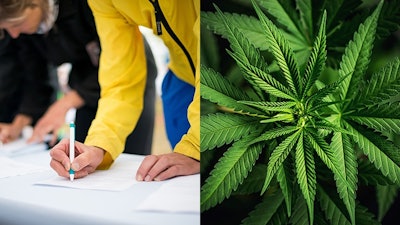
Missourians in all likelihood will hold the key to adult-use cannabis legalization in the November 2022 election after activists submitted more than double the required signatures to the Secretary of State’s Office.
While Legal Missouri 2022, a registered political action committee (PAC), needs roughly 171,500 valid signatures in order to put its issue before state voters, the group submitted more than doubled that benchmark with the 385,000-plus signed petitions it turned in May 8.
The Missouri Secretary of State’s Office must validate roughly 45% of the submitted signatures—making sure signees wrote their information clearly, are registered to vote, etc.—for the group to receive final approval for the ballot.
“As we submit more than 385,000 petition signatures to the state today, the message from voters is clear: It’s past time to end the senseless and costly prohibition of marijuana,” John Payne, Legal Missouri 2022’s campaign manager, said in a public statement.
“This widespread and enthusiastic show of support from the people of Missouri exceeds our expectations,” he added, noting how the signature total slightly exceeded the amount collected during the 2018 campaign that led to voter approval of medical cannabis. “We look forward to the timely review and certification of our petition by the Secretary of State’s Office as we continue to educate and inform voters in the coming weeks and months.”
In 2018, Payne successfully led the A New Approach campaign to land the state’s medical cannabis initiative on the ballot. Officials from that effort submitted more than 370,000 signatures before getting the green light from the Secretary of State.
Legal Missouri’s 2022 measure would amend the Missouri Constitution to: legalize cannabis for those 21 and older; allow individuals convicted of nonviolent cannabis-related offenses to petition to be released from incarcerations and/or have their records automatically expunged; establish a lottery to award licenses, distributed equally to congressional districts; require a registration card for personal cultivation; and impose a 6% tax on cannabis sales, among other provisions.
According to the group’s website, the constitutional measure would add, over time, a minimum of 144 new small businesses to the existing 378 licensed and certified medical cannabis businesses in the state: 18 in each of the state’s eight congressional districts, with at least six per district operating as dispensaries and the remainder designated as wholesalers. However, the measure would allow local communities to opt out of adult-use retail operations through a vote of the people.
But some cannabis advocates aren’t so sure that’s the best plan.
When Missouri state Rep. Ron Hicks, R-St. Charles County, presented his adult-use cannabis bill, the Cannabis Freedom Act, before the House Public Safety Committee in March, Christina Thompson, of advocacy group ShowMe Canna-Freedom, implicitly said she opposed the initiative sponsored by Legal Missouri 2022 because she claimed it would create a monopoly for businesses already operating in the state’s medical cannabis program.
“Without this legislation, our Constitution will be corrupted for profit by the ballot initiative Legal Missouri 2022,” Thompson said. “This is the same group that designed the broken medical marijuana program, and they want to write another violent and subversive business monopoly into our state Constitution. I say monopoly because this initiative eliminates nearly all competition through constitutionally protected license caps.”
Legal Missouri 2022 received more than $2.5 million in cash contributions in support of its ballot effort, including $250,000 from Good Day Farm Missouri LLC, $250,000 from BD Health Ventures LLC, $247,500 from New Growth Horizon LLC and $177,500 from Green Four Ventures LLC, according to the Missouri Ethics Commission.
While Hicks has advocated for a free-market approach without license caps, that approach has held up his sponsored legislation from advancing this session.
During the House Public Safety Committee hearing in March, Hicks pointed to what he called the state’s voter-approved medical cannabis program’s shortcomings as a reason to support his legislation. Because the medical cannabis legalization measure was written into the state Constitution, lawmakers’ hands are tied at fixing any of those shortcomings, he said.
State Rep. Ashley Bland Manlove, D-Kansas City, who is working with Hicks on the legislation, also expressed opposition to the Legal Missouri 2022 campaign, NPR in Kansas City reported.
“Eighty percent of the licenses will go to persons who already have a medical license,” Manlove said. “So that means nobody else new gets into this industry, which is heart-wrenching since so many people I know—people who actually put blood money, like their settlements from car accidents, to try and get into the medical industry.”
But with the Missouri House unlikely to move on Hicks’ bill before a May 13 adjournment, a ballot initiative appears to be the state’s best bet on legalizing adult-use cannabis this year.
ACLU of Missouri Executive Director Luz Maria Henriquez expressed support for Legal Missouri 2022’s proposal, NewsTalk KZRG reported.
“To combat the racial disparities rampant in marijuana-related arrests, our organization remains committed to opposing laws which criminalize adult use of marijuana and supporting automatic expungement of marijuana-related offenses,” Henriquez told the news outlet.
Specifically, a 2020 ACLU report found that Black Missourians are 2.6 times more likely to be arrested for cannabis possession than white people in the state, despite comparable national cannabis usage rates.
Under Missouri’s current laws and penalties, possessing 10 grams or less of cannabis is a misdemeanor punishable by a $500 max fine, but second-time offenders are subject to up to one year of incarceration and a $2,000 fine. Possessing more than 35 grams is a felony punishable by up to seven years of incarceration and a $10,000 fine.


























